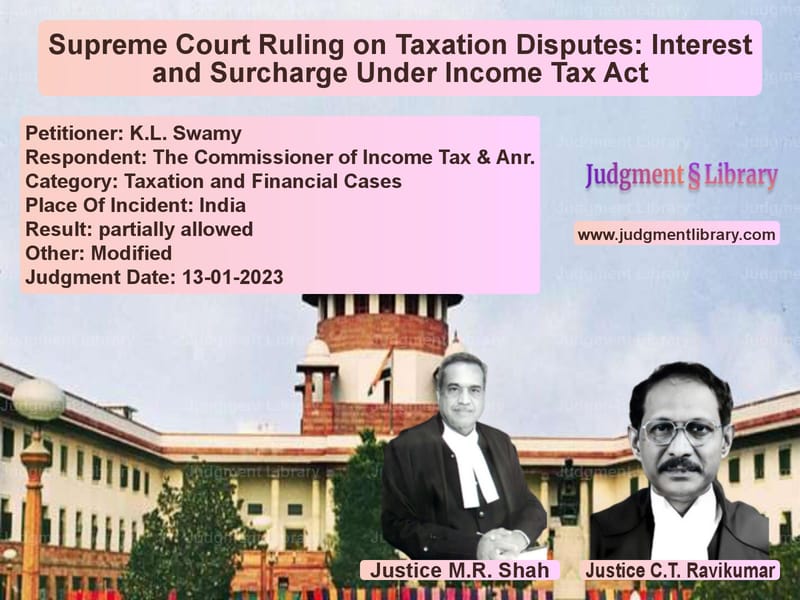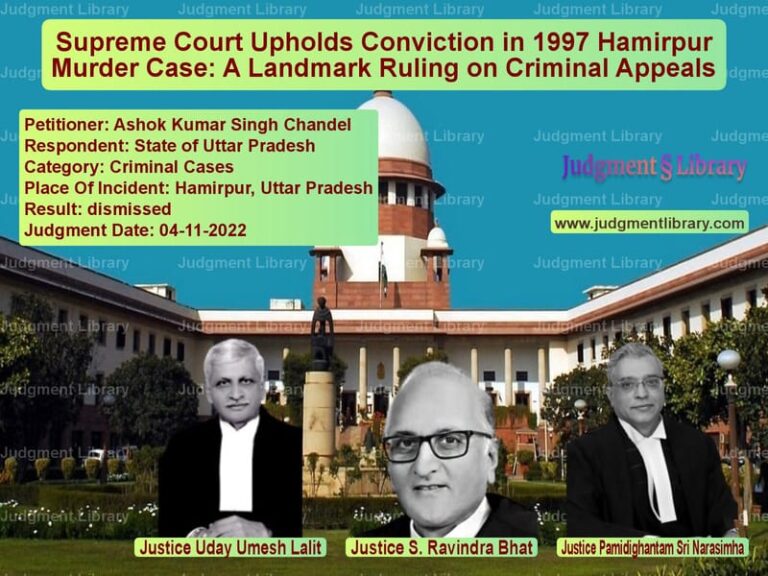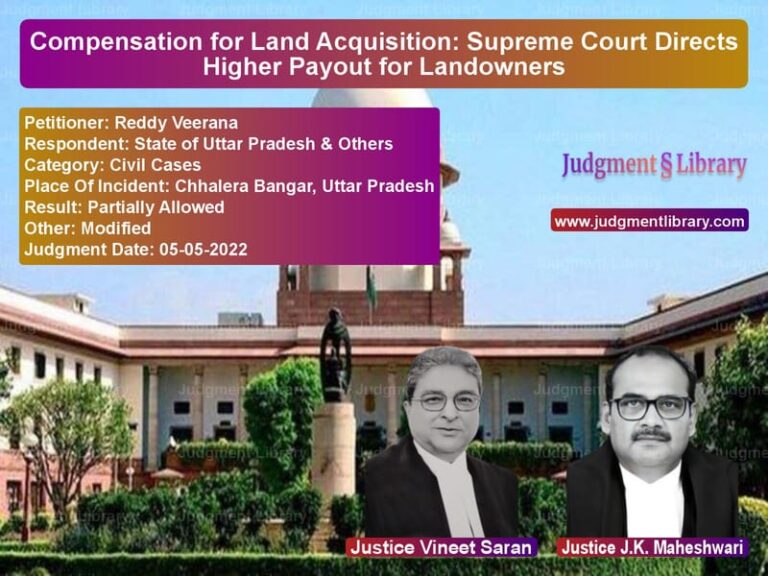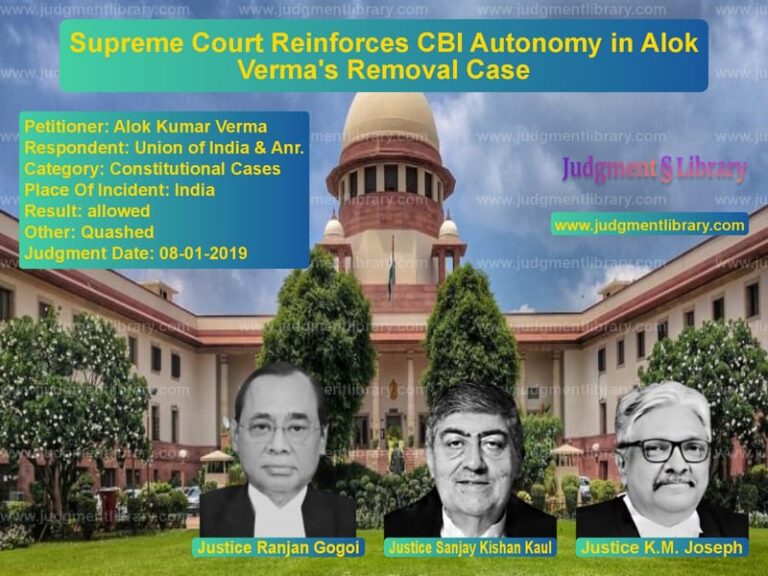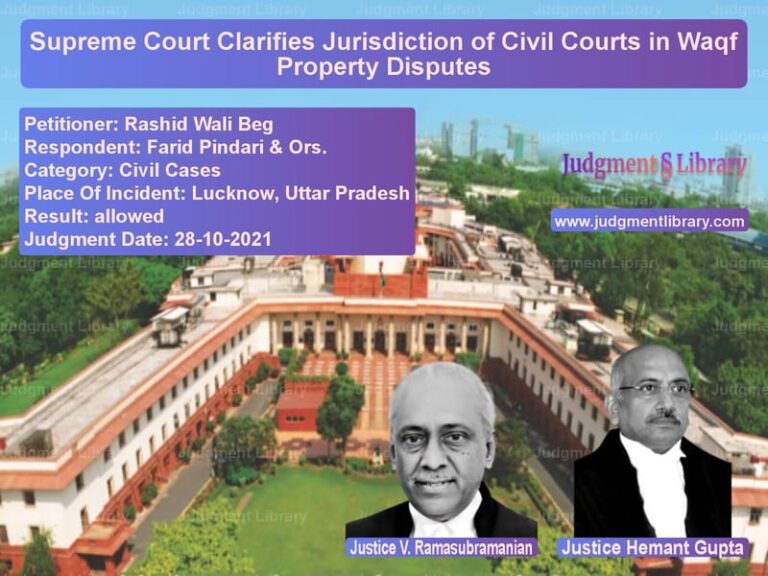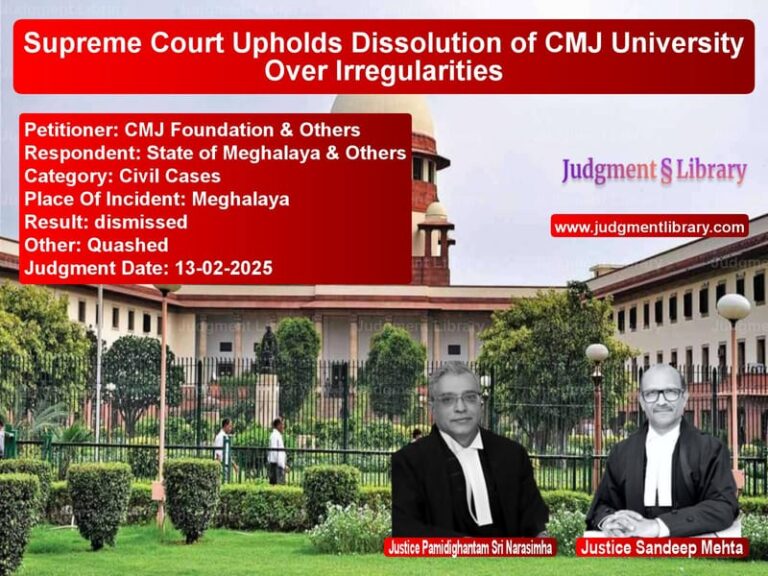Supreme Court Ruling on Taxation Disputes: Interest and Surcharge Under Income Tax Act
The Supreme Court of India in the case of K.L. Swamy vs. The Commissioner of Income Tax & Anr. delivered a crucial verdict regarding the levy of interest under Section 158BFA(1) and surcharge under Section 113 of the Income Tax Act. This judgment holds significance for taxpayers facing block assessment proceedings and those dealing with retrospective amendments in taxation laws.
Background of the Case
The case originates from a search conducted under Section 132 of the Income Tax Act at the residential premises of various individuals linked to the Khoday Group. The appellant, K.L. Swamy, a director and partner in Khoday Group companies, was served a notice under Section 158BD to file his block return of income for the period from 01.04.1986 to 13.02.1997.
The appellant filed a return disclosing undisclosed income but was subsequently levied interest under Section 158BFA(1) for late filing of returns. The appellant contested this before the CIT(A), followed by an appeal before the ITAT, and later in the High Court. The High Court ruled in favor of the Revenue, leading to an appeal before the Supreme Court.
Key Legal Issues Considered
- Whether interest under Section 158BFA(1) could be levied despite the appellant not being issued a notice under Section 158BC.
- Whether the amendment introduced by the Finance Act, 2002, in Section 158BD made it mandatory to issue a notice under Section 158BC before levying interest.
- Whether surcharge under Section 113 could be retrospectively applied before its amendment in 2002.
- Whether the levy of interest and surcharge violated principles of natural justice.
Petitioner’s Arguments
The appellant presented the following arguments:
- The assessment was based on a notice issued under Section 158BD, and no notice under Section 158BC was ever issued.
- The amendment made in 2002, which inserted the phrase “under Section 158BC” in Section 158BD, was prospective and could not apply to assessments before the amendment.
- Since Section 140A did not originally apply to block assessments under Chapter XIV-B, the liability to pay advance tax did not arise, making the levy of interest under Section 158BFA(1) invalid.
- The retrospective application of surcharge under Section 113 was unlawful, following the principles established in Vatika Township Pvt. Ltd.
Respondent’s Arguments
The Revenue presented the following counterarguments:
- The liability to pay interest under Section 158BFA(1) was mandatory for late filing of returns, regardless of whether a notice under Section 158BC was issued.
- The amendment in Section 158BD by Finance Act, 2002, was merely clarificatory and did not affect the power to levy interest under the existing provisions.
- Block assessment proceedings were self-contained, and interest was an integral part of the delayed tax payment mechanism.
- The surcharge under Section 113 was applicable as per prevailing laws, and there was no bar on retrospective application before the 2002 amendment.
Supreme Court’s Judgment
After extensive deliberation, the Supreme Court ruled as follows:
- The amendment to Section 158BD introduced by the Finance Act, 2002, was clarificatory and did not impact the power to levy interest under Section 158BFA(1).
- Interest under Section 158BFA(1) was applicable to cases where returns were filed late, regardless of whether the notice was issued under Section 158BC or 158BD.
- The levy of surcharge under Section 113 was not applicable in this case, as retrospective application was impermissible following the ruling in Vatika Township Pvt. Ltd.
- The High Court’s decision was partially set aside, ruling in favor of the appellant on the issue of surcharge while upholding the interest levy.
Analysis of the Judgment
The Supreme Court’s ruling provides clarity on key issues related to taxation under the Income Tax Act, particularly regarding block assessment and interest levies.
Implications for Taxpayers
- Taxpayers must ensure timely filing of returns to avoid interest under Section 158BFA(1).
- Retrospective application of tax provisions remains a contentious issue, requiring legislative clarity.
- Procedural fairness in tax assessments is critical to upholding taxpayer rights.
Implications for Tax Authorities
- Tax authorities must ensure that notices under Section 158BC and 158BD comply with statutory requirements.
- The ruling limits the retrospective application of surcharge, requiring clarity in tax law amendments.
- Proper documentation and adherence to procedural fairness are essential in block assessment cases.
Conclusion
The Supreme Court’s judgment reaffirms the principle that taxation must be based on clear legislative provisions and that interest levies for delayed filings are valid even in block assessment cases. However, it provides relief by ruling that surcharge under Section 113 cannot be retrospectively applied, ensuring fair treatment of taxpayers.
Petitioner Name: K.L. Swamy.Respondent Name: The Commissioner of Income Tax & Anr..Judgment By: Justice M.R. Shah, Justice C.T. Ravikumar.Place Of Incident: India.Judgment Date: 13-01-2023.
Don’t miss out on the full details! Download the complete judgment in PDF format below and gain valuable insights instantly!
Download Judgment: k.l.-swamy-vs-the-commissioner-of-supreme-court-of-india-judgment-dated-13-01-2023.pdf
Directly Download Judgment: Directly download this Judgment
See all petitions in Income Tax Disputes
See all petitions in Tax Refund Disputes
See all petitions in Banking Regulations
See all petitions in Tax Evasion Cases
See all petitions in GST Law
See all petitions in Judgment by Mukeshkumar Rasikbhai Shah
See all petitions in Judgment by C.T. Ravikumar
See all petitions in partially allowed
See all petitions in Modified
See all petitions in supreme court of India judgments January 2023
See all petitions in 2023 judgments
See all posts in Taxation and Financial Cases Category
See all allowed petitions in Taxation and Financial Cases Category
See all Dismissed petitions in Taxation and Financial Cases Category
See all partially allowed petitions in Taxation and Financial Cases Category

